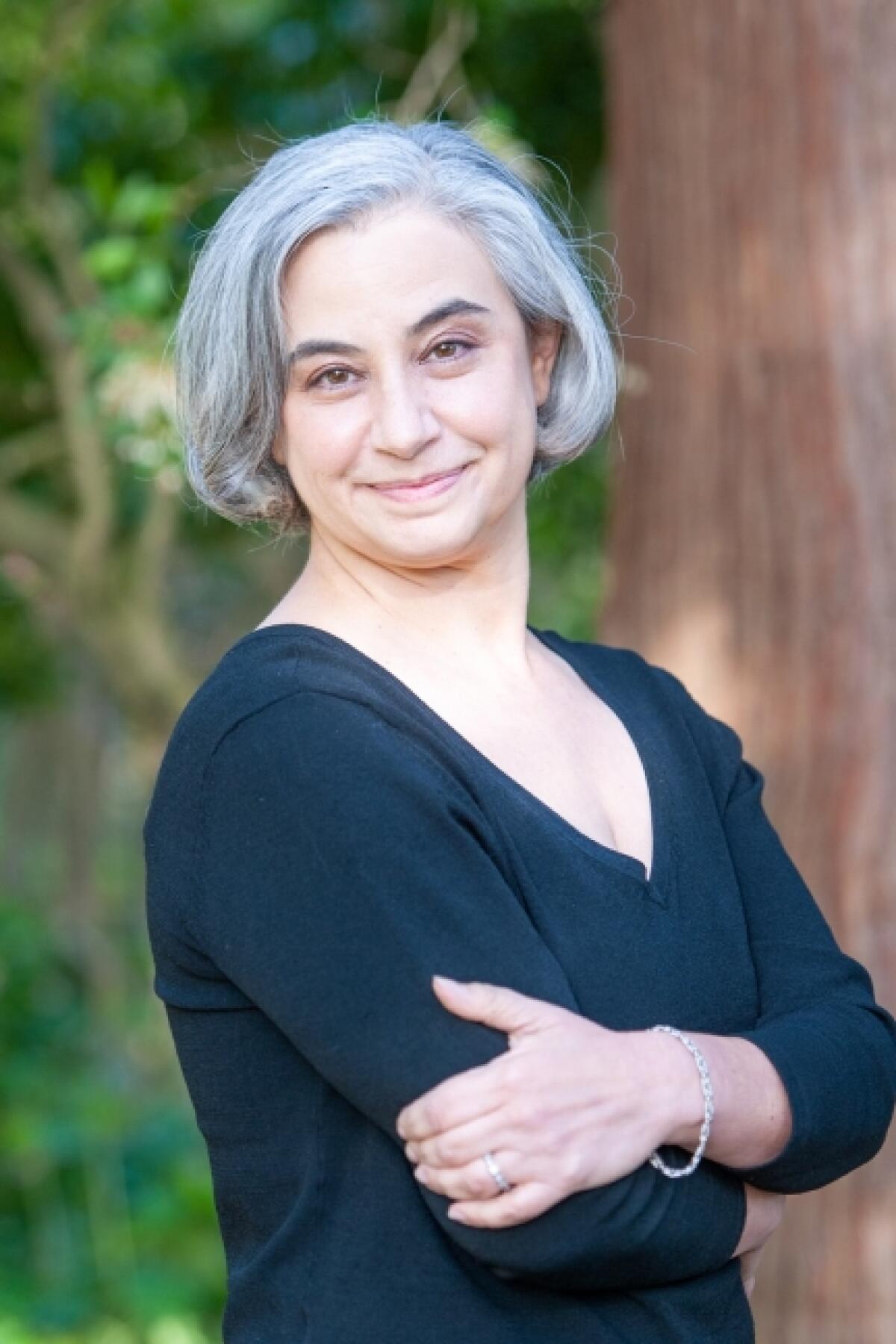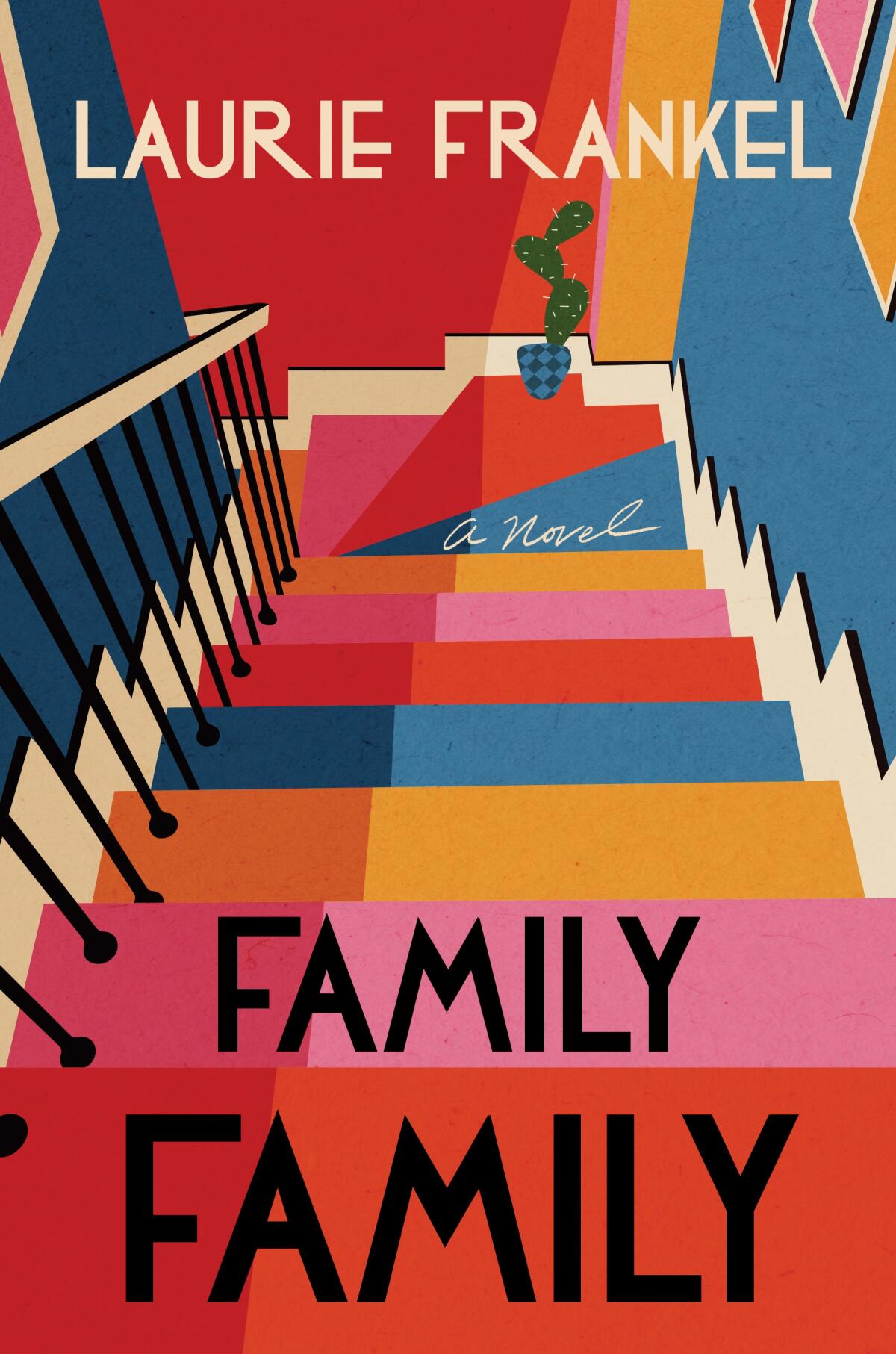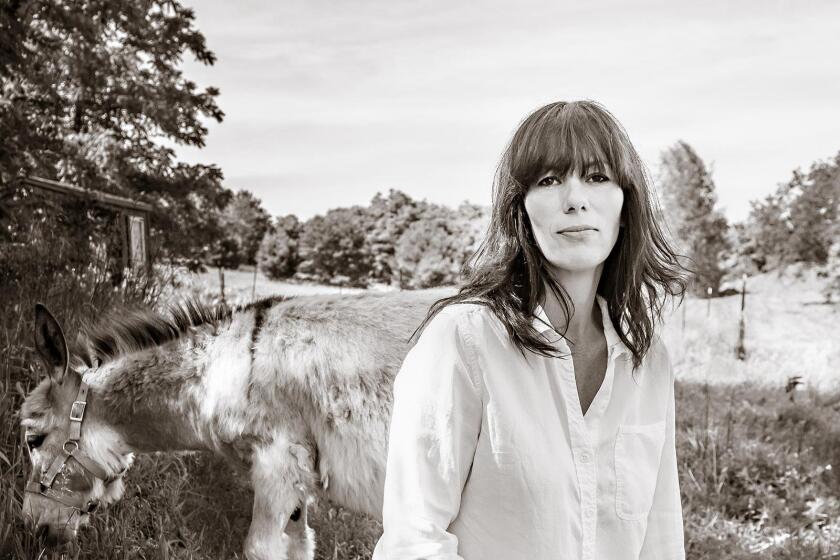Not every adoption story is a tragedy. That’s why Laurie Frankel’s new novel is a blast

- Share via
Book Review
Family Family
By Laurie Frankel
Holt: 400 pages, $29
If you buy books linked on our site, The Times may earn a commission from Bookshop.org, whose fees support independent bookstores.
The first question you ask before digging into Laurie Frankel’s new novel, “Family Family”: What does that mean? The answer is as bewildering and eye-opening as the story itself: a family of families. Or: It’s what Frankel’s protagonist, India Allwood, has created by giving up two biological children for adoption and later adopting twin siblings. This family affair turns into a family romance and a family love story — and in true Frankel fashion, it juggles so many questions about what makes a family that readers will feel tossed about and rearranged.
That’s Frankel’s signature style; just read 2017’s “This Is How It Always Is” and 2021’s “One, Two, Three” (and you should) to know what I mean. Her characters often break all the molds and see all the angles. India does both: Her haphazard approach to birth control never dims her determination to work as an actor, and her observations teeter-totter between insouciance and profundity. (“There are lots of ways to make a family. Suggesting yours is tragic unless everyone’s blood related isn’t serving anyone.”)
In “Big Swiss,” a woman follows her own curiosity to extremes both damaging and hilarious, in a razor-sharp comedy worthy of Ephron, Maupin and Russo.
Since the book begins mid-juggle, some grounding might help: At 16, India and her high school boyfriend Robbie discover she’s pregnant, and after a few weeks of playing a card game they call “Baby War,” she decides to carry the child to term and place it for adoption. (The term “place for adoption” is important, as you’ll see.) That baby girl, adopted by single mother Camille, is named Rebecca, later Bex.

After India moves to Manhattan for drama school, she falls in love with a classmate named Davis and again becomes pregnant, this time unexpectedly giving birth onstage while playing Lady Macbeth. Davis, who is Black, wants to marry India and raise their child together, but India knows that if she chooses that path, she’ll never make it as an actor.
And so the book properly begins — in 2023. India is the star of a television smash hit called “Val Halla” (her superhero role involves a horned helmet) and a single mother of adopted twins. She’s also just finished a movie, “Flower Child,” about a tragic, drug-addicted couple whose baby winds up in the social services system. When India decides to make a controversial public statement about the movie, all hell breaks loose in Hollywood, especially when India’s reproductive history inspires pro-life advocates to hold her up as a model of motherhood.
All India wants is to protect the children she sees as her own, Fig and Jack, whom she began parenting when they were 4 years old and traumatized by their mentally ill mother. Now 10, the twins decide to intervene on India’s behalf; all hell breaks loose at home too. Before India or her quirky agent Ajax can draft a statement, Camille and Bex have arrived, with Davis soon following. Everyone wants to help, but no one knows exactly how to fix the mess made by India’s outspoken belief that adoption isn’t only about trauma, loss, abandonment and lifelong grief.
“All’s Well,” Mona Awad’s delightfully odd but strangely noncommittal new novel, concerns a woman who overcomes her ailments in Shakespearean ways.
Frankel knows whereof she writes. Many readers will recognize her name from her novel about parenting a trans child, “This Is How It Always Is,” which is based on her experience adopting a child of Korean origin. She learned that her child identified not as a boy but as a girl, and in this novel’s Author’s Note, Frankel writes about that journey with honesty and humor.
She does the same with India’s journey, although at times her descriptions of India’s professional path seem more frustratingly tangled than any adoption process. Long sections about her college off-Broadway work and her first big break can seem discursive, especially when parts start to zigzag between different eras in India’s still-quite-young life. Do we really need to know about stage-blocking techniques while we’re yearning to find out how and when and why India adopted her twins?
Perhaps we do, because India’s work is as important to her as everything else in her chaotic, lively, creative and privileged life. Frankel, who tells us in that Author’s Note about how adoption was a deliberate decision for their family (she and her spouse did not feel the need for a biological child), wants to show that adoption can be joyful — and heartbreaking, and difficult, and confusing — for everyone involved. One of the most splendid scenes in “Family Family” occurs when Davis has a heart-to-heart with his child, Lewis, about adoption and race. “[Lewis] looked up at Davis. ‘No one knows what I am.’ Davis puffed up his cheeks and blew the air out slowly. ‘Yeah. Boy do I get that.’ And Lewis knew right then the whole trip was worth it....”
Of course, Frankel works in fiction, and all sorts of loose ends are tied up for India and her motley crew of family members. Even after a somewhat improbable move by the four kids brings the clan up to Robbie’s Oregon home, there’s very little angst and plenty of tidiness, coziness and safety. But Frankel wants to place this “family family” in a safe spot.
A social comedy on ‘detransitioning’ asks: Who is anyone to judge?
This is why the author wants us to say children are “placed,” not “given up,” for adoption. As she knows from experience, very few birth parents “give up” their children. The adoption process remains as complicated as the human psyches involved, and “Family Family” is one of those books that everyone involved in adoption should read. Make that one of those books that everyone involved in a family should read. Frankel’s funny, heart-wrenching and thought-provoking account of how one woman’s choices can enrich the lives of others will remind you that every family circle is potentially infinite.
Patrick is a freelance critic, podcaster and author of the memoir “Life B.”
More to Read
Sign up for our Book Club newsletter
Get the latest news, events and more from the Los Angeles Times Book Club, and help us get L.A. reading and talking.
You may occasionally receive promotional content from the Los Angeles Times.











